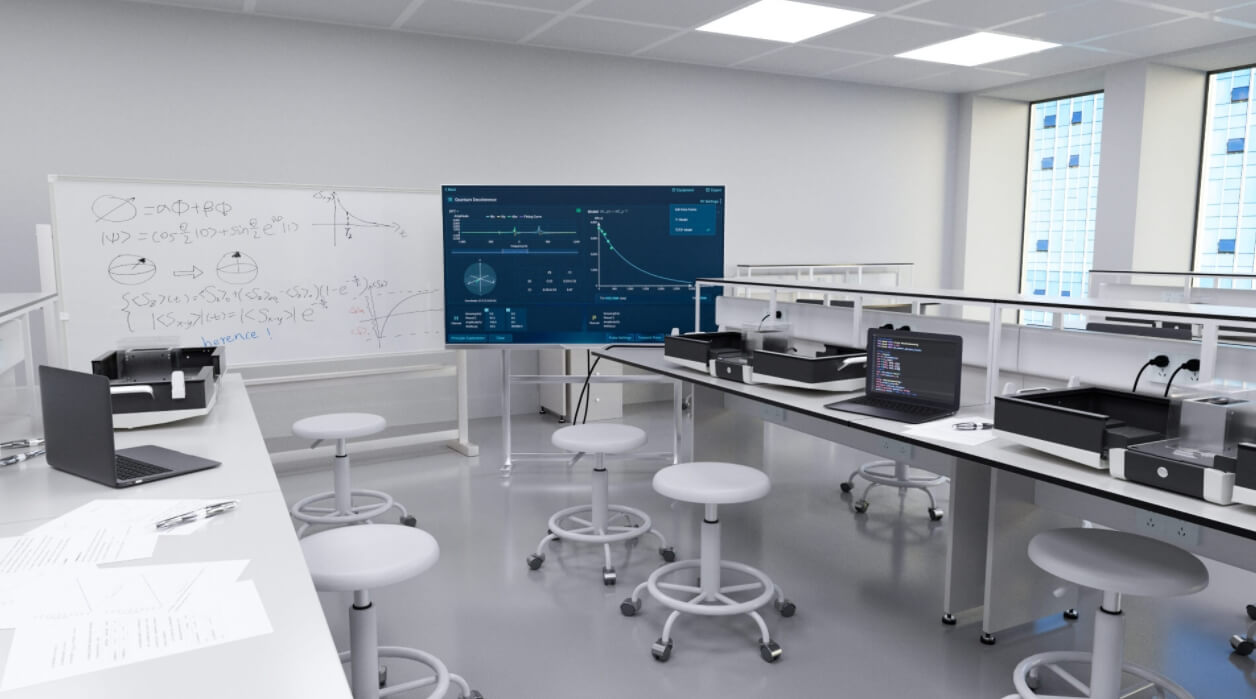Quantum Computing Top Courses 2025 – SpinQ Quantum Educational Solutions
2025.07.30 · Blog Quantum Computing Top Courses 2025 SpinQ Quantum Educational Solutions
-
Introduction
The year 2025 marks a pivotal moment for quantum science and technology worldwide, officially recognized as the International Year of Quantum Science & Technology by the United Nations. This global focus highlights not only quantum’s transformative potential across sectors but also the urgent need to cultivate a skilled quantum workforce.
As industries forecast a surge in quantum-related jobs — estimates predict over 250,000 new quantum professionals globally by 2030 — there’s a widening gap between the demand for talent and the availability of qualified individuals. Institutions, educators, and governments are racing to develop educational pathways that not only teach quantum theory but also foster practical skills and real-world application.
SpinQ Quantum Educational Solutions has emerged as a leading provider dedicated to addressing this challenge, offering a holistic portfolio of courses, experimental tools, and cloud-based platforms that serve learners at all levels — from K–12 through university research programs.
This article explores the top quantum computing courses in 2025, with special emphasis on how SpinQ’s integrated approach empowers learners worldwide.
-
Major Global Quantum Computing Courses & Certifications 2025

The quantum education landscape in 2025 is diverse, offering options from industry-backed certifications to rigorous university courses:
2.1 Industry Certifications
-
Microsoft Azure Quantum Developer Certification This widely respected certification offers learners a free, practical introduction to quantum programming using Microsoft’s Q# language. It covers key topics such as quantum algorithm design, resource estimation, and running programs on real Azure Quantum hardware. The certification suits professionals aiming to enter the quantum software development workforce quickly.
-
edX – University of Chicago "Quantum Computing for Everyone" A beginner-friendly course designed to demystify quantum computing concepts without heavy mathematical prerequisites. This self-paced certification (~3 months) provides a solid foundation for further study and is priced affordably to encourage broad access.
2.2 Top University Courses (Online & In-Person)
-
MIT xPro Quantum Computing Fundamentals Targeted at professionals and students alike, this course blends foundational theory with business and technical implications, preparing learners to leverage quantum technologies in real-world settings.
-
Caltech – Quantum Algorithms for Scientific Computing A deep dive into quantum algorithms like Shor’s and Grover’s, with applications in machine learning and scientific simulations, ideal for advanced students and researchers.
-
ETH Zurich – Introduction to Quantum Technologies Emphasizes hardware fundamentals, helping learners understand the physical principles and engineering challenges behind quantum devices.
-
IIT Madras / NPTEL Quantum Computing Workshop Focused on hands-on experience using IBM Quantum’s cloud resources, this workshop targets learners in India and beyond seeking practical skills.
2.3 Specialist & Advanced Programs
Courses offering focused learning paths in quantum machine learning, cryptography, and variational algorithms include:
-
University of Toronto (Coursera) – Quantum Machine Learning
-
UC Berkeley (edX) – Quantum Mechanics and Computation
-
AWS Braket – Quantum Algorithms for Applications
-
Udacity Nanodegree – Quantum Computing
These programs emphasize applying quantum computing techniques to industry-relevant problems.
-
SpinQ Quantum Educational Solution – Course Portfolio & Approach
SpinQ’s educational offerings are designed to bridge the gap between theoretical knowledge and practical expertise.
3.1 Course Levels & Design Philosophy
SpinQ recognizes the varied needs of learners at different stages — from stimulating young students’ curiosity to equipping university researchers with hands-on hardware experience. Its courses are modular and scalable, making them adaptable across diverse educational systems and cultures.
3.2 University-Level Courses
-
Theory Modules cover mathematical foundations (linear algebra), quantum states, gates (Hadamard, CNOT), quantum algorithms (Deutsch-Jozsa, Grover, VQE), error correction, and quantum communication protocols.
-
Experimental Modules provide immersive labs on NMR physics, pulse control techniques, and quantum simulation, where students program real quantum hardware and interpret outcomes.
3.3 High School (K–12) Courses
Designed to introduce fundamental quantum concepts in engaging ways, SpinQ’s K–12 courses explore:
-
Basic quantum gates and circuits through interactive visualizations
-
Foundational algorithms like Deutsch’s and Grover’s to demonstrate quantum speedup
-
Introductory concepts of qubits, superposition, and entanglement, fostering early STEM interest
3.4 Public Outreach Initiatives
SpinQ supports public engagement through:
-
Quantum Science Corners: interactive public exhibits that allow learners to experiment with simplified quantum devices.
-
Quantum Chess: a gamified tool illustrating quantum phenomena like superposition and entanglement through intuitive gameplay, making complex ideas approachable and fun.
-
Supporting Infrastructure & Tools

4.1 Hardware Platforms
SpinQ offers a range of accessible quantum hardware:
-
Gemini Mini & Mini Pro: portable, room-temperature 2-qubit NMR systems featuring touchscreen controls, ideal for classroom or individual use.
-
Triangulum II: a 3-qubit NMR desktop system offering expanded experimental capabilities with open pulse programming, tailored for university labs.
-
Gemini Lab Platform: a research-grade system designed for advanced quantum experiments, including gate-level and algorithm-level programming.
4.2 Software & Cloud Platform
-
The SpinQit SDK provides an intuitive environment for circuit design, QASM coding, and running quantum algorithms, supporting seamless integration into classroom and research workflows.
-
SpinQ’s cloud platform allows remote access to real quantum hardware, enabling scalable and flexible learning opportunities across geographic boundaries.
-
Course Paths & Learning Outcomes
5.1 Progression Overview
Learners follow a structured path:
-
K–12 Track: Introducing concepts with games and simple circuits
-
High School Theory & Labs: Building understanding through basic algorithms and hardware demos
-
University Theory: Deep dives into quantum mechanics, algorithms, and error correction
-
University Experimental Labs: Hands-on programming and hardware control
-
Advanced Remote Projects: Leveraging SpinQ’s cloud platform for complex research and application development
5.2 Skills & Competencies
Graduates of SpinQ courses develop:
-
Strong grasp of quantum principles: superposition, entanglement, and measurement
-
Practical skills in programming quantum circuits and pulse sequences
-
Ability to design and analyze quantum algorithms such as Grover’s and VQE
-
Experience with hybrid classical-quantum workflows and real-device error management
5.3 Benefits for Learners & Institutions
-
Enables institutions to address global quantum talent shortages by providing affordable, hands-on tools.
-
Supports learners’ transition into the quantum workforce with both theoretical depth and experimental expertise.
-
Offers global reach, with SpinQ hardware and courses deployed across 30+ countries.
-
Comparison with Other Top Programs
| Course / Program | Level | Hands-on Hardware Access | Notes |
| Microsoft Azure Q# Certification | Beginner–Intermediate | Simulated only | Great theoretical foundation |
| University of Chicago (edX) | Beginner | Simulated/tutorial-based | Accessible, theory-heavy |
| MIT / Caltech / ETH Zurich | Intermediate–Advanced | Simulated/research lab | Deep theoretical and research-focused |
| SpinQ Courses (Theory + Experimental + Cloud) | All levels | Real device + Cloud | Holistic, integrated, globally accessible |
SpinQ stands out for its hands-on access to real hardware paired with comprehensive curricula, bridging the gap many courses leave between theory and practice.
-
Strategic Insights
Educational institutions and enterprises should build blended learning pathways, combining SpinQ’s real-hardware courses with recognized online certifications (e.g., Microsoft Azure, edX). This approach ensures:
-
Theoretical rigor alongside practical skills development
-
Access to real quantum devices to deepen comprehension
-
A well-prepared talent pipeline to meet industry demands
Given the projected quantum workforce shortage, integrating hands-on, affordable quantum education solutions is vital to stay competitive in the quantum era.
-
Conclusion
In 2025, mastering quantum computing demands a comprehensive educational experience that blends foundational theory with hands-on experimentation and cloud access. SpinQ Quantum Educational Solutions provides a uniquely integrated portfolio enabling learners at all levels to develop both conceptual understanding and practical expertise — critical for preparing the next generation of quantum scientists and engineers.
By coupling SpinQ’s offerings with global certifications and university programs, educators and learners gain a full-spectrum education aligned with the accelerating pace of quantum technology adoption.
Featured Content






